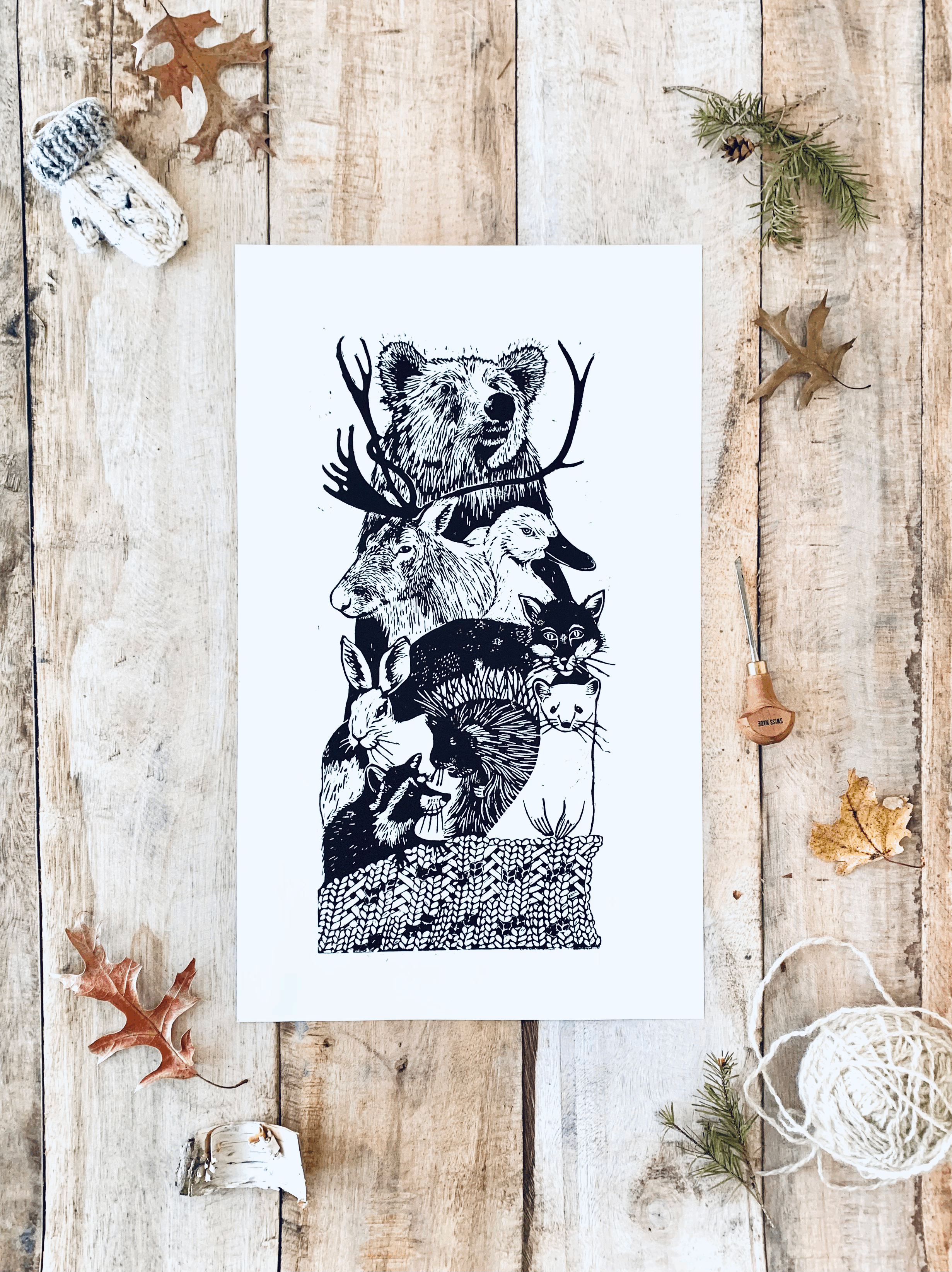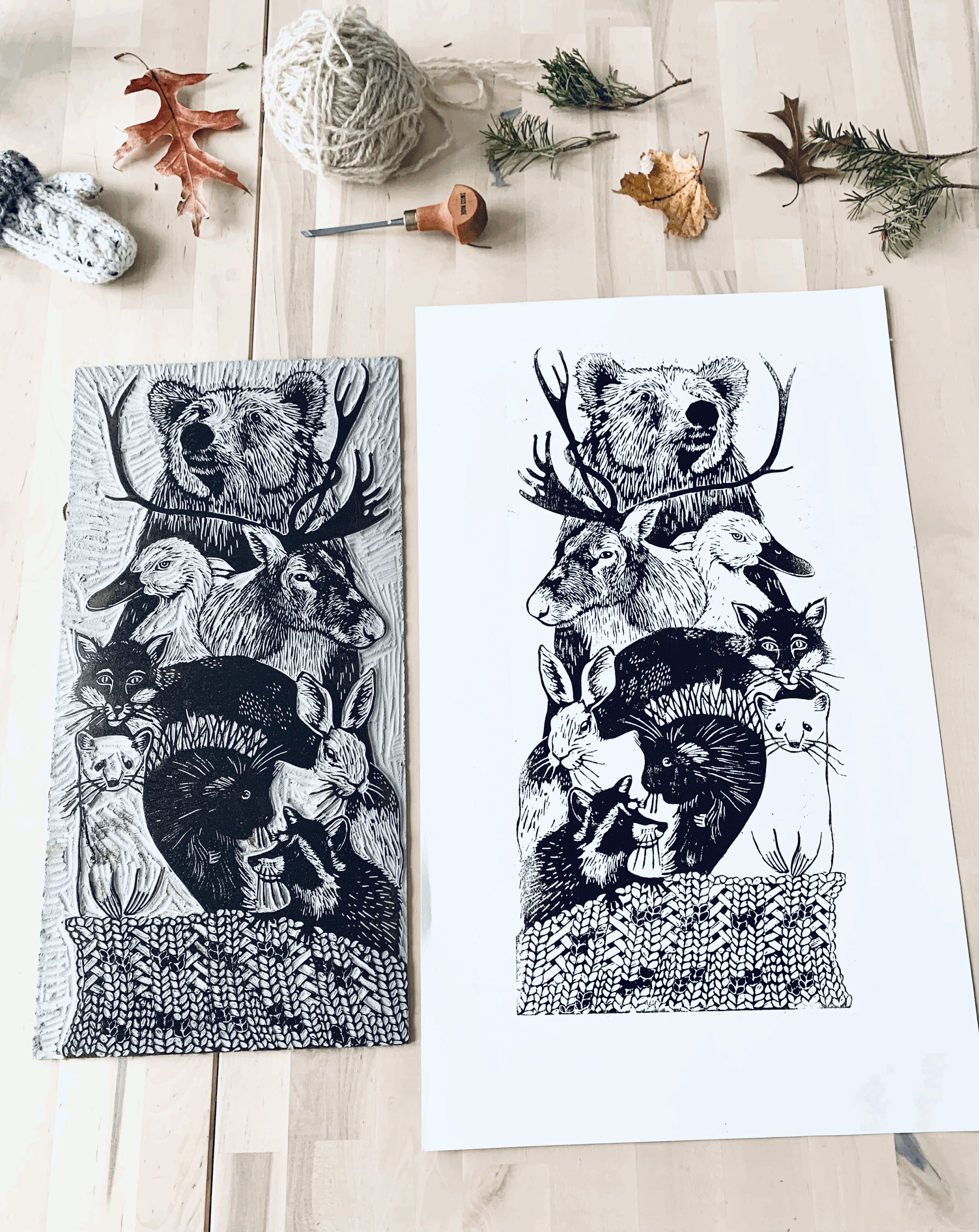This is a handmade linocut print featuring woodland animals inspired by a folktale from Ukraine, retold by beloved children’s book author Jan Brett in her book The Mitten. The artwork includes various woodland animals: a bear, elk, duck, fox, marten, porcupine, rabbit and raccoon all trying to fit inside a mitten!
There is an Abenaki (indigenous North American) legend reminding us to feed the future as we feed ourselves. . . such poignant wisdom in these times. It is told in the voice of Grandmother Woodchuck — the wise elder who teaches that true abundance lies in restraint, foresight, and care for future generations. In her story a young hunter, Gluscabi, fills his mitten-bag with more than he needs, threatening the food supply of seven future generations. Through her quiet guidance, he learns to take only what is necessary and leave the rest to thrive.
The story mirrors the Ukranian folktale The Mitten (popularized by beloved children’s author and illustrator Jan Brett) in both theme and shared forest folklore wisdom. In it, a single small mitten is shared by many woodland creatures - bears elk, duck, fox, marten, porcupine, rabbit, and raccoon - each one climbing in, stretching the mitten to its limits, until it can hold no more. The tale captures the joy of generosity and the gentle tension of limits, revealing how abundance and community coexist in delicate balance.
Between the two synchronistic tales from distant landscapes lives a shared lesson: when we forget future generations in our choices, we risk losing everything. Both stories are about the right thing to do when things are scarce. In the Ukrainian version, it is about not packing the mitten too tightly and in the Abenaki version it is, similarly, about not taking in excess of one’s needs. This print honors the feminine, earth-centered wisdom that shelters and teaches — the kind that reminds us when to take and when to share, and how to live in a way that leaves enough for those yet to come.
I love the idea of a collective consciousness: enduring patterns of thought that exist across cultural divides revealing universal themes in the human psyche, and our deep ancient connection to each other. Great creative thinkers like psychologist Carl Jung and mythologist Joseph Campbell speak about the idea of a collective consciousness, and how the frequent existence of myths that share similar archetypes and storylines despite having originated from distant geographical locations and different cultures shows there is more than just coincidence at play. There is an undercurrent of universal themes that show up in folktales and fairytales that are told in different languages from different countries and the mystery and magic of this synchronicity deserves our attention.
I believe folktales and fairytales have been told and retold time and time again over generations for a reason: because those who came before us must have felt the stories contained wisdom that would be valuable for future generations. Shared wisdom like the importance of sharing resources when times are scarce is one that. transcends culture and resonates universally. Though our ancestors were not faced with the same environmental or economic or political problems that we are confronted with today, humans have always had to face scarcity of resources. Perdita Finnn talks about the importance of listening to the ancestors in her book Take Back the Magic: Conversations with the Unseen World. She speaks about the valuable role ancestors can play in helping us handle the overwhelming problem of climate change. She says, “What if the dead themselves hold the answer to that question? After all they have borne witness to at least six mass extinctions over the course of the planet. They have endured ice ages and floods, super eruptions and genocides. What if we consulted and listened to them? What if we trusted them to guide us forward?” Her words make sense in the context of folktales because they are the voices of our ancestors!
The carved and inked block of linoleum next to the actual linocut print.
In both the Ukrainian and Abenaki versions of this story, greed and disregard for others’ is disfavored over thinking about others’ well-being even though the latter choice comes at a sacrifice, and even though the one extending generosity may never meet, be known or acknowledged by those who benefit from their genoerosity. In fact, in the Abenaki version, the Grandmother character is thinking many generations ahead of herself, and the story is framed in such a way that the reader is implicated in the mind of the Grandmother character. She made the choice to include us when she thought about how much she needed. . .because today it is possible to witness the abundance of the earth. After reading a story like this, I feel moved to act with the same gesture of generosity towards future generations. Amidst climate change and the scarcity of resources we are faced with, this folktale compels me to ask the question: “Am I acting like Gluscabi, taking more than what I really need from the earth to survive?”, and “What can I leave behind for the children of the future?”
It matters less where the folktale originated. . .what is more important is how the teaching resonated for people in two vastly different landscapes and that they honored and retold it year after year so that their descendants could benefit. I love how this shared value of thinking of future generations fosters collective empathy, cooperation, and a sense of interconnectedness and continuity between the generations motivating us to resolve our conflicts today in order to strive towards a common goal for the future. It brings me great joy to retell this ancient folktale by designing and printing this handcrafted linocut to decorate a living space, children’s room or community space in hopes that its timeless wisdom can be remembered.
Note * Gluscabi is the benevolent culture hero of the Wabanaki people (a Confederacy of eastern Algonquian nations: the Mi’kmaq, Maliseet, Passamaquoddy and Penobscot)
References:
Brett, Jan (1996). The Mitten. G.P. Putnam's Sons Books for Young Readers.
Bruchac, Joseph (1997). Keepers of the Earth: Native American Stories and Environmental Activities for Children. Fulcrum Publishing.
Finn, Perdita (2023). Take Back the Magic: Conversations with the Unseen World. Running Press Adult.









Singebis is an ancient Ojibwe winter folktale about a beloved folk hero and wild grebe whose perseverance, courage, resilience, and loyalty in the face of Kabibona'kan, Winter Maker, shows us we can do the same in the face of adversity. This story asks us to reflect on what kinds of Kabibona'kans do we face in our lives today that threaten to divide us from others who might be our friends? This folktale reminds us we all have the capacity to tap into our inner Singebis, find our inner trickster, and remind ourselves that even a little wild bird can outsmart the Winter Maker!